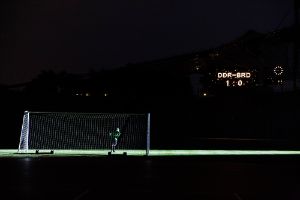Performance
A Reenactment of the 1974 East Germany – West Germany World Cup Match
by Massimo Furlan with Tanja Walther-Ahrens

Massimo Furlan, A Reenactment of the 1974 East Germany – West Germany World Cup Match © Sandra Singh
As part of its Kunstparcours “Radical Playgrounds: From Competition to Collaboration” the Berliner Festspiele presents Massimo Furlan’s reenactment of the historic 1974 World Cup Football match between East Germany and West Germany that ended with a score of 1:0. For the first time, on 7 and 8 July, the match will take place not in a stadium, but where the Berlin Wall once stood, on Niederkirchnerstraße between the House of Representatives and the Gropius Bau.
The reenactment of the 1974 football match is about the representation of athletic and social asymmetry. The match was the only direct duel between both German teams to ever take place at a World Cup. Since the qualification of both teams had already been decided, it was primarily a political encounter between two countries that had only recently officially recognised each other. The game represented a confrontation between strength and weakness, arrogance and underestimation and the subconscious lines of division. Taking those aspects as starting points, we ask where the lines of asymmetries lie today, in politics, in sport, in everyday life, shedding light on women and queer presence in football.
Only two players act out the game and imitate the players’ movements: Massimo Furlan himself as Sepp Maier, and the football player, activist for women’s football and former player for 1. FFC Turbine Potsdam Tanja Walther-Ahrens as Jürgen Sparwasser. Two original radio commentaries accompany the match, and the audience can switch back and forth between these parallel realities in East and West.
This performance is the celebration of the power of imagination. The idea came from the broken dream of a young boy who failed to become a famous football player. The same story goes for many kids all over the world, especially as football gets more commercialised. Furlan shifted those aspirations into art. As a choreographer repeating the movements of Michel Platini, he ran in the Parc des Princes, as Zbigniew Boniek in Warsaw or as Sepp Maier in the Olympiastadion in Munich. In art, dreams come true.
Do you know the story? Listen to it again.
Massimo Furlan (born 1965) is a choreographer, actor, performer, and writer based in Lausanne often exploring the connections between games and play.
Tanja Walther-Ahrens is a former German football league player, special education teacher, sports scientist and activist. Today, she is still a passionate footballer in the Berlin state league with SV Seitenwechsel.